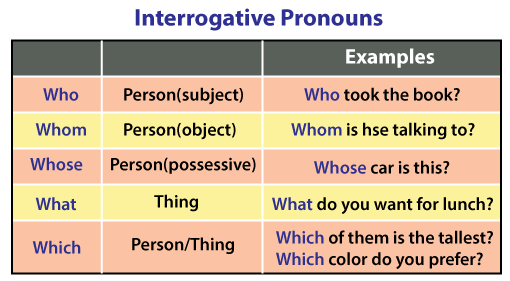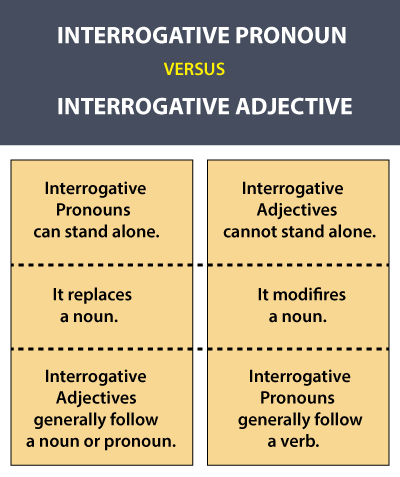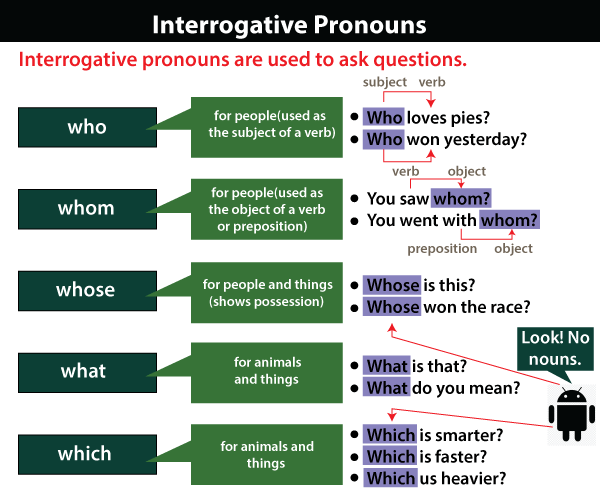Interrogative PronounsWho is your closest companion? What is your favorite type of food? Which of the rainbow's colors is your favorite? Finally, what exactly is a pronoun? If you're a grammar whiz, you're already aware that a pronoun is a term that we employ to substitute a noun. Pronouns appear in a wide range of our phrases, including questions. 
The interrogative pronouns are the pronoun that always asks for replies. If all of these queries, have you thinking about what an interrogative pronoun is, then keep reading. What is the definition of an interrogative pronoun?The interrogative pronouns are one that are used to pose a question. For instance, in the phrase who are you? The term that is an interrogative pronoun. Interrogative pronouns, like many other pronouns, substitute nouns in statements. 
Interrogative pronoun often substitutes whatever or whoever the answer to the query/question implies. An interrogative pronoun is a kind that is utilized to make it easier to ask questions. There are mainly five interrogative pronouns in the English Grammar. Each of the type is utilized to ask either direct or indirect queries. Some words, such as "who" and "whom," solely relate to persons. Other words could be used to describe things or individuals. Once you've mastered interrogative pronouns, you will find it much easier to employ them in a number of contexts. Interrogative pronouns are often employed as the relative pronoun in the direct or indirect question. Since this type pronouns are only present in inquiries and indirect queries, you will know for definite that a pronoun is an interrogative when it's employed in an enquiring manner. The main or the primary interrogative pronouns include; What, which, who, whom, and whose. For instance, What is an apple? An apple is a kind of fruit. Who built this structure? Peter erected this shed. An interrogative pronoun is typically the first term in an interrogative statement that always concludes with a question mark. A statement that uses an interrogative pronoun to pose an indirect inquiry may not conclude with a question mark: I'm curious who will arrive tomorrow. She inquired as to what we desired for lunch. Interrogative pronouns listThe interrogative pronoun forms can be utilized to emphasize or indicate surprise as interrogative pronouns. Who, whom, whose, what, and which encompass the most common and most regularly used interrogative pronoun. Longer variants of these terms ending in -ever are also used less frequently: whoever, whomever, whosever, anything, and whichever. The above-mentioned pronouns can function as singular or plural terms based on what they relate to. 
Who and whomThe terms "Who and whom" are employed to pose queries where the intended response is an individual. Who is referred to as a subject, and whom is referred to as an object. WhoseWhose is a query that is used to inquire about possession, ownership, or a relationship. WhatWhat is used to pose a question where the expected answer is an object or an abstract concept. WhichNext in the list is the term "Which" i.e. utilized to pose queries or questions with various options or alternatives for answers. Interrogative pronouns examplesLet's have a glance at how each of the interrogative pronouns is used in phrases. Who and whomWho grabbed the handkerchief? Who will take home the national title? Whom did you provide the card to? Whom did the cops presume of the burglary? WhoseI spotted this handbag. Whose is it? There are boots by the gate. Whose are they? Look at that big mansion at there. Whose fault is it? WhatWhat exactly is romance? What are those blossoms named? What are people attempting to do? WhichWhich of these biscuits do you really want? Kate either washed her living space, or she didn't. Which one is it? We can visit the beach or the nature reserve. Which seems more enjoyable? Interrogative pronouns as other parts of speechThe terms who, whom, whose, what, and which can be categorized as various kinds of words beyond interrogative pronouns based on how they are employed in statements. The relative pronouns who, whom, whose, and which are some of the kinds that are also employed. Relative pronouns have been used to initiate relative phrases rather than asking inquiries. For instance, in the statement, I am searching for the person who sent the message, the term "who" is the relative pronoun. The terms whose and which can also be employed as interrogative adjectives. Interrogative adjectives substitute the nouns and are not used as subjects or objects on their own. For example, Which is the correct answer to the interrogative pronoun? (Which is utilized on its own.) Interrogative adjective: Which response is correct? (This alters the noun response.) Interrogative pronouns: How to Use ThemIn most cases, interrogative pronouns are often used as an initial word in a question: Who was that? What is her favorite thing? However, an interrogative pronoun can be used afterward in a question: You donated the money to whom? Please excuse me. You utilized what to make this dessert? An interrogative pronoun can be singular or plural, but its look does not alter depending on whether it is singular or plural. Nevertheless, when employed in a sentence, it must still adhere to the subject-verb agreement: What is your contact information? What are the symbols that are missing? Flipping the interrogative statement around can help you determine whether you require the singular or plural verbs: Who (is/are) these people? These folks (is/are) who? Who and WhomConfusion between who and whom is a common grammatical error. Who is the subject of a phrase or statement, and whom is the object of a statement, clause, or prepositional phrase? To determine which one of these pronouns is utilized, simply exchange the words he or him. You can use who, if you feel in the sentence it is making relevance and sense to employ he. You can utilize whoever if you see the sentence is making sense to replace him. (Hint: they both end with the letter M.) As an example, _____is the chairman? In the sentence it is making sense to employ He is the chairman, but not to say Him is the chairman. As a result, we would employ the word who. ________did Mary call? Interrogative statements can be difficult to understand because things are frequently reversed. This query seeks the identity of the person who is called Maria. When answering this question, it is incorrect to state Mary called he, but it is correct to say Mary called him. As a result, we employ whom. Interrogative Pronouns must not be mixed with Interrogative Determiners.Interrogative pronouns should not be confused with interrogative determiners (called "interrogative adjectives" in classical grammar), which have the same appearance as interrogative pronouns. Interrogative determiners are used to change nouns or pronouns. It is essential to take into account the below mentioned questions; Which route is the most secure? What kind of meals are they purchasing? Whose one should we use? (The bold texts in these examples are not interrogative pronouns. They function as interrogative determiners. They do not exist in isolation. They are all used to modify nouns or pronouns.) Compare the preceding instances to the following: Which is the most secure? What are they purchasing? Whose should we use? (These are all stand-alone.) They are interrogative pronoun.) 
Don't mix up interrogative pronouns and interrogative adverbs"Why," "where," "when," and "how" are the interrogative adverb. Interrogative adverbs are often utilized to pose queries or questions, but the replies are also adverbs. A noun is clearly the answer to an inquiry that begins with an interrogative pronoun (or an interrogative determiner). What shall we do? (Biking) (The reply to an interrogative pronoun query is often the terms or the words or phrases that functions as the nouns, such as a nouns, pronouns, or a noun phrases.) Why do you have to depart? (Because it's starting to become gloomy) (The response to the interrogative adverbs query is usually terms that functions as the adverbs, such as the adverb, the adverbial phrases, or the adverbial sentences.) It's an adverbial phrase in this case. Errors using "who" and "whom" should be avoided.The most common problem with interrogative pronouns is employing "who" when "whom". It is often a question of where and how these must be employed. Note that "who" can only be employed as the subject of a verb. This is a much more basic concept than you would believe. "I," "he," "she," "we," and "they" are similar to "who" in that they are also used as the verbs or subjects (they're even termed subjective pronouns). "Me," "he," "her," "us," and "them" are similar to "whom" in that/they are never been used as verb subjects (they are called objective pronouns). Who recognizes her? (The subject of "recognizes" is "who," thus "who" is the right answer.) Who do you remember? (You is the subject of "remember," not "who." "Who" is incorrect.) Whom do you remember? For further clarity, you can consider asking rhetorical questions. A rhetorical inquiry can be asked using an interrogative pronoun (a question for which no response is expected). A rhetorical question is a powerful and engaging approach to making a point or introducing a new subject. What is sugarcane? Sugarcane is a plant whose complete advantages have yet to be found. 
Interrogative Pronoun ExamplesSince sentences with interrogative pronouns are always questions, they must conclude with a question mark. Interrogative pronouns have been italicized in the following samples to make them easier to identify.
Next TopicReflexive Pronouns
|
 For Videos Join Our Youtube Channel: Join Now
For Videos Join Our Youtube Channel: Join Now
Feedback
- Send your Feedback to [email protected]
Help Others, Please Share










